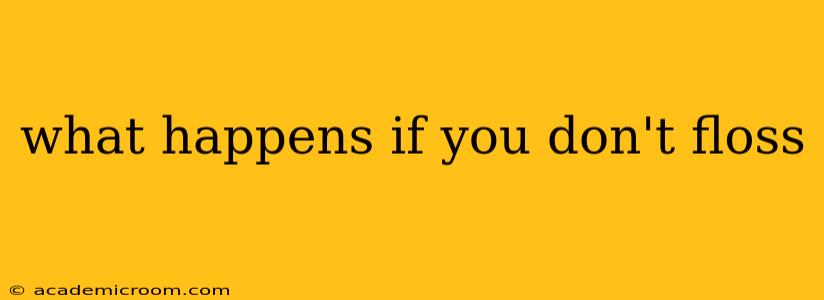We all know brushing is important, but what about flossing? Many people underestimate the crucial role flossing plays in maintaining optimal oral health. Ignoring this simple step can lead to a cascade of serious dental problems. Let's explore the consequences of neglecting flossing and uncover the truth about this often-overlooked aspect of oral hygiene.
What are the consequences of not flossing?
Failing to floss regularly allows plaque, a sticky film of bacteria, to build up between your teeth and along the gumline. This plaque hardens into tartar (calculus), a substance that brushing alone can't remove. This build-up is the root cause of many oral health issues.
What are the problems caused by not flossing?
Gingivitis (Gum Inflammation):
This is the earliest stage of gum disease. Inflamed gums are often red, swollen, and bleed easily when brushing or flossing. While gingivitis is reversible with improved oral hygiene, neglecting it allows it to progress to more severe stages.
Periodontitis (Gum Disease):
If gingivitis is left untreated, it progresses to periodontitis. This more advanced form of gum disease involves the destruction of the tissues and bone supporting your teeth. Periodontitis can lead to loose teeth, tooth loss, and even impact overall health. Studies have linked severe gum disease to an increased risk of heart disease, stroke, and diabetes.
Cavities (Dental Caries):
Bacteria in plaque produce acids that attack tooth enamel, leading to cavities. While brushing removes plaque from the surfaces of your teeth, flossing is essential for reaching those hard-to-reach areas between your teeth where cavities commonly form.
Bad Breath (Halitosis):
The bacteria trapped between your teeth release volatile sulfur compounds, a primary cause of bad breath. Regular flossing helps to remove these bacteria, contributing to fresher breath.
Tooth Decay:
Beyond cavities, neglecting flossing contributes to overall tooth decay, potentially leading to the need for fillings, root canals, or even extractions. The cumulative effect of plaque and tartar weakens the tooth structure over time.
How often should I floss?
Dental professionals recommend flossing at least once a day, ideally before brushing at night. This allows you to remove food particles and plaque before they can harden into tartar.
What are some tips for effective flossing?
- Use the correct technique: Gently curve the floss around each tooth, ensuring you reach below the gumline.
- Use a fresh section of floss for each tooth: This prevents the spread of bacteria.
- Don't snap the floss against your gums: This can cause damage.
- Consider using interdental brushes: These are particularly helpful for people with wider spaces between their teeth or those with braces.
Can I use other tools instead of floss?
Yes, there are alternatives to traditional floss, including interdental brushes, water flossers (oral irrigators), and floss picks. The best choice depends on your individual needs and preferences. It’s always best to consult with your dentist to determine the most effective method for your oral hygiene routine.
Is it too late if I haven't flossed regularly?
It's never too late to start! Even if you haven't flossed regularly in the past, incorporating it into your daily routine can significantly improve your oral health. See your dentist for a professional cleaning and assessment to address any existing issues and develop a personalized oral hygiene plan. They can also provide guidance and address any concerns you may have about flossing.
By understanding the consequences of neglecting flossing and adopting a consistent oral hygiene routine, you can protect your teeth and gums, ensuring a healthy and confident smile for years to come. Remember, your oral health is an integral part of your overall well-being.
